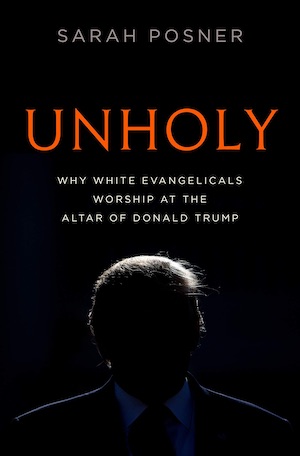By Louis J. Kern
Doonesbury’s Rev. Scot Sloan posed the conundrum of the incongruous evangelical allegiance to Donald Trump, noting, “They’ve apparently adjusted their positions on sexual assault, cruelty, lying, and all seven deadly sins! Character no longer counts!” (October 8, 2020). Sarah Posner concurs, revealing in devastating detail how and why white evangelicals, abandoning the moral high ground, enthusiastically embraced a “biblically illiterate libertine.” Foundations for that alliance were laid down over five decades by political operatives like Paul Weyrich, co-founder of the Heritage Foundation (1973) and the Moral Majority (1979) and godfather of the religious New Right, and Sam Francis, the controversial journalist and patron saint of the populist alt right who, stressing a politics or resentment and victimhood, demanded “Caesarist tactics” (“Message From Mars [Middle American Radicals]: The Social Politics of the New Right,” 1982).
Contrary to popular belief, evangelical politicization did not originate with Roe v. Wade but was rooted in segregation and opposition to civil rights—Jerry Falwell promoted the candidacy of George Wallace (1968). Their holy war against abortion only began in 1976 and expanded to opposition to feminism, LGBTQ rights, and secularism. After decades of Republican failure to provide satisfaction, Trump was seen as a transgressive outsider, blessed with a “breaker anointing” as the divinely chosen autocrat to return America to its Christian theocratic roots. It’s a symbiotic relationship—Trump receives perfervid adoration and blanket inculpability while evangelicals enjoy reaffirmed whiteness and promulgation of puritanical religious bigotry.
What makes it almost incestuous is how closely Trump’s reality-television/con man persona so closely approximates that of a popular televangelist, whose charismatic ministries are essentially business ventures grounded in showmanship and the “prosperity gospel,” promising supernatural financial success and magical/spiritual restoration and prophylaxis via faith healing. Their churches, like Trump, are tax exempt, and their devotees are seemingly immunized against sexual scandals and financial frauds perpetrated by revered leaders like Jim Bakker and Jimmy Swaggart. Trump is thus the ideal knight errant to lead the revanchist crusade to impose racial and religious intolerance.
Posner meticulously explores the cynical, cult-like, anti-democratic Slough of Despond of militant white populism that has consumed, ouroboros-like, the Republican Party. Focus on white evangelicals, however, overlooks other important allies—like Odinism, Creativity, and some charismatic Catholics. Though she warns that Trump’s evangelical base “not only doesn’t care—it actively cheerleads the denigration of democracy and human rights . . . [evincing] disdain for what America once was,” her analysis fails to fully illuminate the extent to which fears of white genocide, cultural diversity, and self-righteous self-pity have undermined the polity.
Republican governance is essentially a tyranny of the minority, or more precisely of minorities—a coalition of the super-rich one percent determining economic and political policy, the evangelicals determining cultural and moral policy, and the white supremacists determining racial and immigration policy. This coalition has achieved an electoral plurality only once in the last eight elections. White evangelicals comprise 17.5 percent of the U.S. religious demographic; 69 percent of them voted for Trump in 2020, viz. 12.6 percent of Trump voters; Catholic charismatics may have added as much as 6.2 percent; and white nationalists/supremacists (circa 20,000 active members in some 450 hate groups with perhaps 50 million internet fellow travelers) comprise 15 percent—thus 33.8 percent determining national policy abetted by 66 percent sharing their grievances and nostalgia for a mythic America.
In 1787 James Wilson warned “equality of voters among the States will subject the majority of the People and Property of each to be governed by a minority . . . [this is] too great a Defeat in the Constitution to permit the expectation of public harmony and Happiness.” His fear is our reality.
Louis J. Kern (ΦBK, Clark University) is professor emeritus of history at Hofstra University. Hofstra University is home to the Omega of New York chapter of Phi Beta Kappa.




